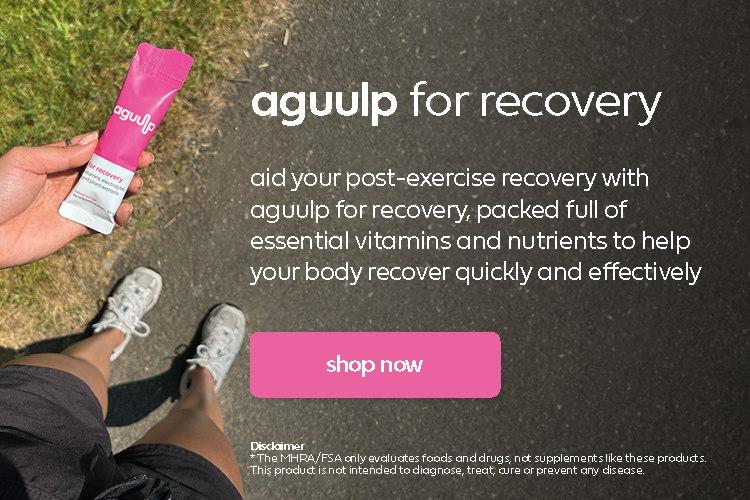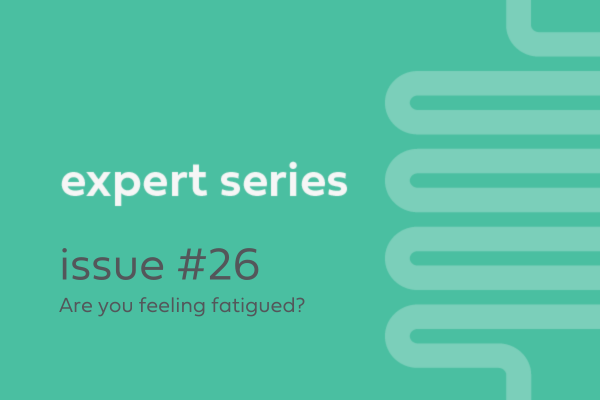What happens to our body post workout?
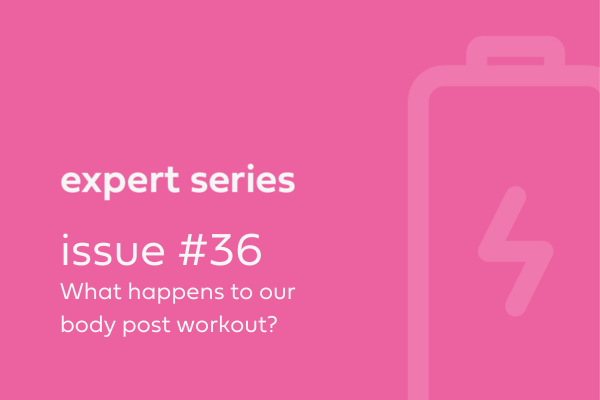
Exercise is a fantastic way to stay fit and healthy, but what happens to our body post workout? The post-exercise period is a critical time when our bodies work to restore energy levels and repair muscles.
In this week’s Expert Series, we delve into the fascinating science behind post-exercise recovery, focusing on what exactly happens to our body, energy levels and muscle rejuvenation. Plus, we’ll share some valuable tips to help you maximise your recovery, and take a closer look at our aguulp for recovery supplement and how it can help further post-exercise.
What happens to our body after exercise?
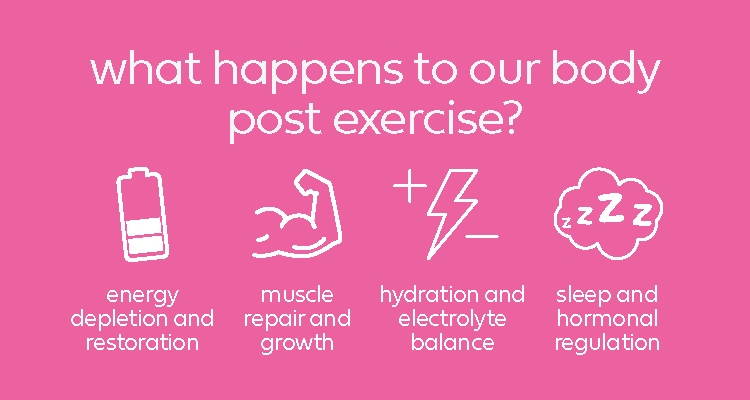
Energy Depletion and Restoration:
During exercise, your body taps into its energy stores, primarily glycogen, to fuel muscle contractions. This can lead to a decrease in glycogen levels. After a workout, our energy stores can be depleted, leaving us feeling fatigued. Your body enters a recovery phase where it replenishes glycogen stores through a process called glycogen synthesis.
To maximise energy restoration, it’s crucial to refuel with a combination of carbohydrates and proteins within the first 30 to 60 minutes after exercise. This helps kick-start glycogen synthesis and sets the stage for a quicker recovery (Jentjens & Jeukendrup, 2003).
Muscle Repair and Growth:
Exercise, particularly resistance training, leads to microscopic damage in muscle fibres. This prompts an inflammatory response and the activation of satellite cells, which play a crucial role in muscle repair and growth. Consuming protein after exercise provides the necessary amino acids for muscle protein synthesis, which is the process of building and repairing muscle tissue (Aragon & Schoenfeld, 2013).
Inflammation and Recovery:
Intense exercise can lead to oxidative stress and inflammation due to increased production of free radicals. While some inflammation is natural and necessary for tissue repair, chronic inflammation can hinder recovery. Nutrients with anti-inflammatory properties, such as omega-3 fatty acids and antioxidants, can aid in reducing inflammation and supporting recovery (Nieman et al., 2012).
Hydration and Electrolyte Balance:
Exercise leads to fluid and electrolyte loss through sweating. Proper hydration is crucial for maintaining blood volume, temperature regulation, and overall cellular function. Replenishing lost fluids and electrolytes post-exercise is essential for preventing dehydration, muscle cramps, and fatigue (Shirreffs & Sawka, 2011).
Neurotransmitter Regulation:
Exercise influences the release of neurotransmitters like dopamine and serotonin. After exercise, neurotransmitter levels tend to balance out, contributing to improved mood and relaxation, often referred to as the “exercise high” (Dishman et al., 2006).
Sleep and Hormonal Regulation:
Regular exercise helps regulate circadian rhythms and sleep patterns, leading to better sleep quality and duration. Exercise also influences hormonal release, including the release of cortisol, which can impact muscle repair and overall recovery. Adequate sleep is crucial for hormone regulation and recovery processes (VanHelder et al., 1989).
Tips for Maximising Post-Workout Recovery
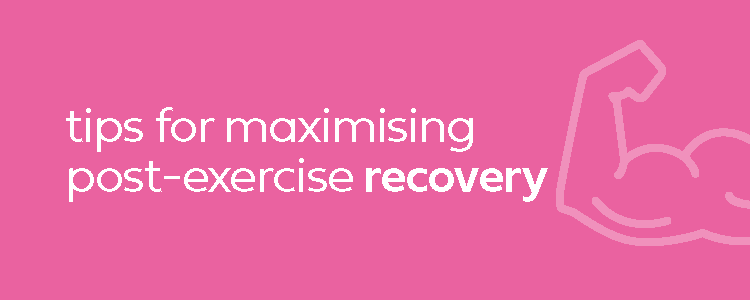
Hydrate: Rehydrate with water to replace fluids lost during exercise, aiding in the recovery process. In cases of prolonged or intense exercise, consider electrolyte supplements to quickly replenish lost minerals.
Balanced Nutrition: A well-balanced diet post-workout plays a vital role in maximising recovery, replenishing energy stores, and promoting muscle repair. Here’s a guide to crafting a nutritious post workout meal:
1. Carbohydrates:
Carbohydrates are essential for refilling glycogen stores and providing energy for recovery. Opt for complex carbohydrates that offer sustained energy release:
- Whole grains (brown rice, quinoa, whole wheat pasta)
- Starchy vegetables (sweet potatoes, squash, beets)
- Fruits (berries, bananas, oranges)
2. Protein:
Protein is crucial for repairing and rebuilding muscle tissue damaged during exercise. Aim for a source of lean protein to support muscle recovery:
- Lean meats (chicken, turkey, lean beef)
- Fish (salmon, tuna)
- Eggs
- Plant-based protein sources (tofu, tempeh, legumes, lentils)
3. Healthy Fats:
Healthy fats support overall health and provide sustained energy. Incorporate sources of unsaturated fats:
- Avocado
- Nuts and seeds (almonds, walnuts, chia seeds)
- Olive oil
4. Vegetables:
Vegetables are rich in vitamins, minerals, and antioxidants that aid in recovery and reduce inflammation:
- Dark leafy greens (spinach, kale)
- Cruciferous vegetables (broccoli, cauliflower)
- Colourful vegetables (bell peppers, carrots, tomatoes)
Vitamins such as B vitamins are particularly essential for replenishing energy stores and supporting recovery. They also play a role in reducing the oxidative stress and inflammation that can result from intense exercise. They help protect cells from damage and support the body’s natural repair processes.
For example, vitamin B6 is involved in protein metabolism and helps in the formation of neurotransmitters, which can aid in muscle recovery and mood regulation. Vitamin B12 is essential for red blood cell production and can contribute to improved oxygen delivery to tissues, including muscles, which is vital for recovery.
Rest and Sleep: Prioritise quality sleep as it is crucial for overall recovery and muscle growth. During sleep, the body releases growth hormone, which aids in tissue regeneration. Poor sleep can hinder these processes, affecting performance and future workouts.
Active Recovery: Engage in light activities like walking or stretching to promote blood flow and reduce muscle stiffness. Active recovery can also psychologically relax and rejuvenate the mind, aiding overall workout performance.
Post workout supplements: how aguulp for recovery can help post workout:
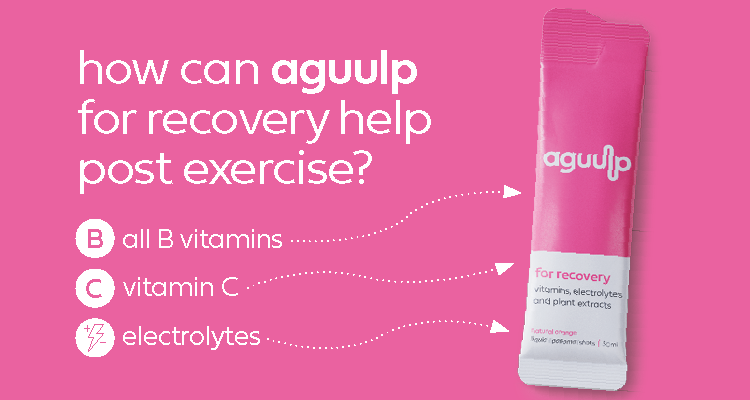
Our aguulp for recovery supplement has been cleverly formulated to aid recovery, whether it’s post exercise, after a long exhausting day or even after a few too many drinks. Containing all the B vitamins, amino acids, electrolytes and milk thistle, this is the perfect supplement to get you back up on your feet in no time. So how does our aguulp for recovery supplement aid post workout?
B Vitamins and energy metabolism:
As mentioned previously, B vitamins are essential nutrients that play a significant role in energy metabolism. While they might not be the first thing that comes to mind when considering post-workout supplements, they do have a role to play in helping your body bounce back after exercise.
B vitamins, including B1 (thiamine), B2 (riboflavin), B3 (niacin), B5 (pantothenic acid), B6 (pyridoxine), B7 (biotin), B9 (folate), and B12 (cobalamin), are crucial for converting the food you eat into energy that your body can use. They help facilitate the breakdown of carbohydrates, proteins, and fats, allowing your body to produce adenosine triphosphate (ATP), the primary energy currency of cells.
Electrolytes and fluid balance:
Electrolytes are vital for post-workout recovery as they help maintain proper fluid balance, muscle function, and overall hydration. When you exercise, especially in hot and humid conditions, you sweat, and along with sweat, you lose electrolytes – minerals such as sodium, potassium, magnesium, calcium, and chloride – that play a critical role in various physiological processes.
Electrolytes are essential for nerve and muscle function, including the contraction and relaxation of muscles. They also help regulate fluid balance and blood pressure, support proper pH levels in the body, and facilitate nutrient transport into cells.
Vitamin C and oxidative stress:
Vitamin C, also known as ascorbic acid, is a water-soluble vitamin that plays a crucial role in several physiological processes. While it’s known for its immune-boosting properties, vitamin C also offers several benefits post-exercise.
Intense exercise generates oxidative stress and increases the production of free radicals, which can damage cells and tissues. Vitamin C is a potent antioxidant that helps neutralise free radicals and reduce oxidative stress, aiding in the recovery process (Bryer & Goldfarb, 2006).
Vitamin C is essential for the synthesis of collagen, a structural protein that plays a critical role in maintaining the integrity of connective tissues, such as tendons, ligaments, and skin. Post-exercise, collagen repair is crucial for muscle recovery and injury prevention.
Vitamin C supplementation has also been associated with reduced muscle soreness and faster recovery after intense exercise. It may help mitigate the inflammatory response and muscle damage associated with strenuous workouts (Bryer & Goldfarb, 2006).
The round-up:
Understanding the post-exercise recovery process is essential for maximising the benefits of your workouts. By focusing on replenishing energy levels and promoting muscle rejuvenation through proper nutrition and supplementation, adequate rest, and self-care, you can optimise your recovery and set the stage for improved performance in future workouts.
References:
American College of Sports Medicine. (n.d.). Nutrition and Athletic Performance.
Aragon, A. A., & Schoenfeld, B. J. (2013). Nutrient timing revisited: is there a post-exercise anabolic window?. Journal of the International Society of Sports Nutrition, 10(1), 5.
Bryer, S. C., & Goldfarb, A. H. (2006). Effect of high dose vitamin C supplementation on muscle soreness, damage, function, and oxidative stress to eccentric exercise. International Journal of Sport Nutrition and Exercise Metabolism, 16(3), 270-280.
Dishman, R. K., Berthoud, H. R., Booth, F. W., Cotman, C. W., Edgerton, V. R., Fleshner, M. R., … & Greenwood, B. N. (2006). Neurobiology of exercise. Obesity, 14(3), 345-356.
Hawley, J. A., Burke, L. M., Phillips, S. M., & Spriet, L. L. (2011). Nutritional modulation of training-induced skeletal muscle adaptations. Journal of Applied Physiology, 110(3), 834-845.
Jäger, R., Purpura, M., Kerksick, C. M., & Cooke, M. B. (2019). The Role of Intra-Workout Nutrition in Optimizing Exercise Performance and Muscular Adaptations. Nutrients, 11(2), 413.
Jentjens, R. L., & Jeukendrup, A. E. (2003). Determinants of post-exercise glycogen synthesis during short-term recovery. Sports Medicine, 33(2), 117-144.
Nedeltcheva, A. V., Kilkus, J. M., Imperial, J., Kasza, K., Schoeller, D. A., & Penev, P. D. (2010). Sleep curtailment is accompanied by increased intake of calories from snacks. The American Journal of Clinical Nutrition, 89(1), 126-133.
Nieman, D. C., Simandle, S., & Myers, L. (2012). Effects of carbohydrate and chromium ingestion during intermittent high-intensity exercise to fatigue. International Journal of Sport Nutrition and Exercise Metabolism, 22(6), 475-482.
Peake, J. M., Neubauer, O., Walsh, N. P., & Simpson, R. J. (2017). Recovery of the immune system after exercise. Journal of Applied Physiology, 122(5), 1077-1087.
Powers, S. K., & Jackson, M. J. (2008). Exercise-induced oxidative stress: cellular mechanisms and impact on muscle force production. Physiological Reviews, 88(4), 1243-1276.
Shirreffs, S. M., & Sawka, M. N. (2011). Fluid and electrolyte needs for training, competition, and recovery. Journal of Sports Sciences, 29(sup1), S39-S46.
Tipton, K. D., Elliott, T. A., Cree, M. G., Aarsland, A. A., Sanford, A. P., & Wolfe, R. R. (2009). Stimulation of net muscle protein synthesis by whey protein ingestion before and after exercise. American Journal of Physiology-Endocrinology and Metabolism, 296(1), E98-E104.
VanHelder, T., Radomski, M. W., & Derman, W. (1989). Sleep, sleep deprivation, and exercise. In Handbook of Sports Medicine and Science: Sports Nutrition (Vol. 3, pp. 61-74).
Woolf, K., & Manore, M. M. (2006). B-vitamins and exercise: does exercise alter requirements? International Journal of Sport Nutrition and Exercise Metabolism, 16(5), 453-484.

